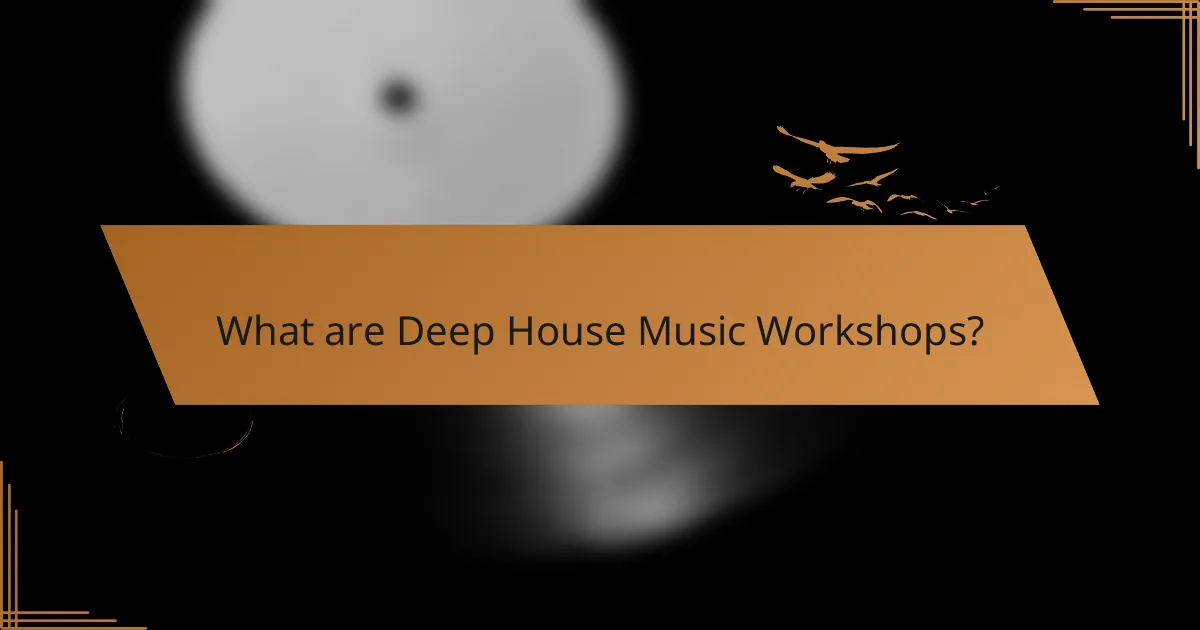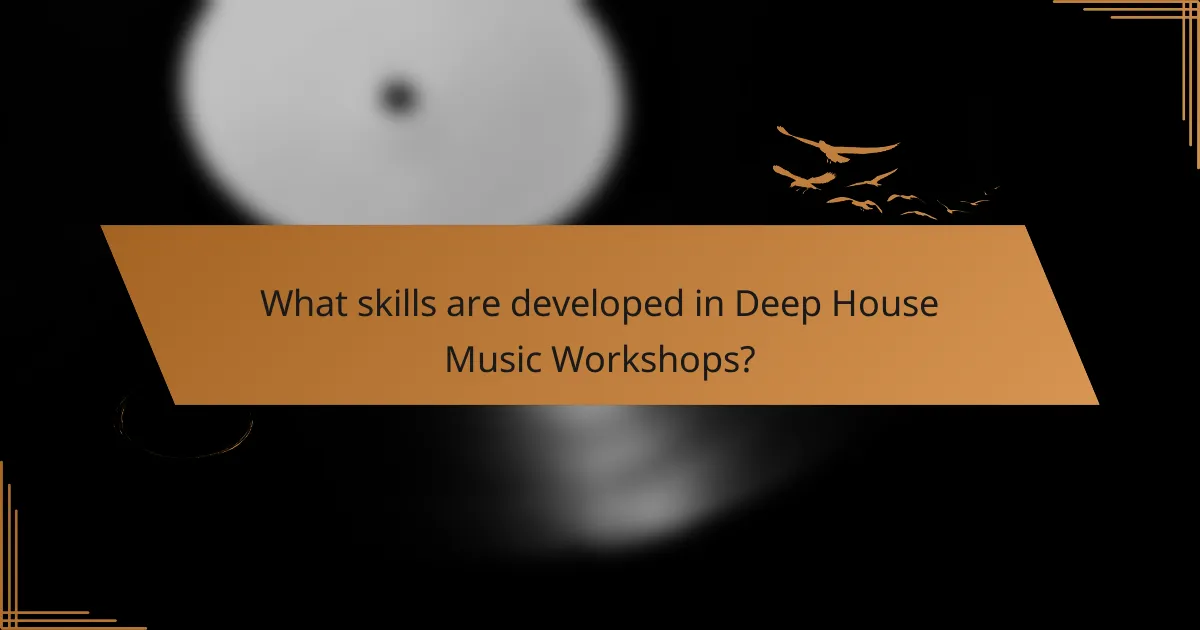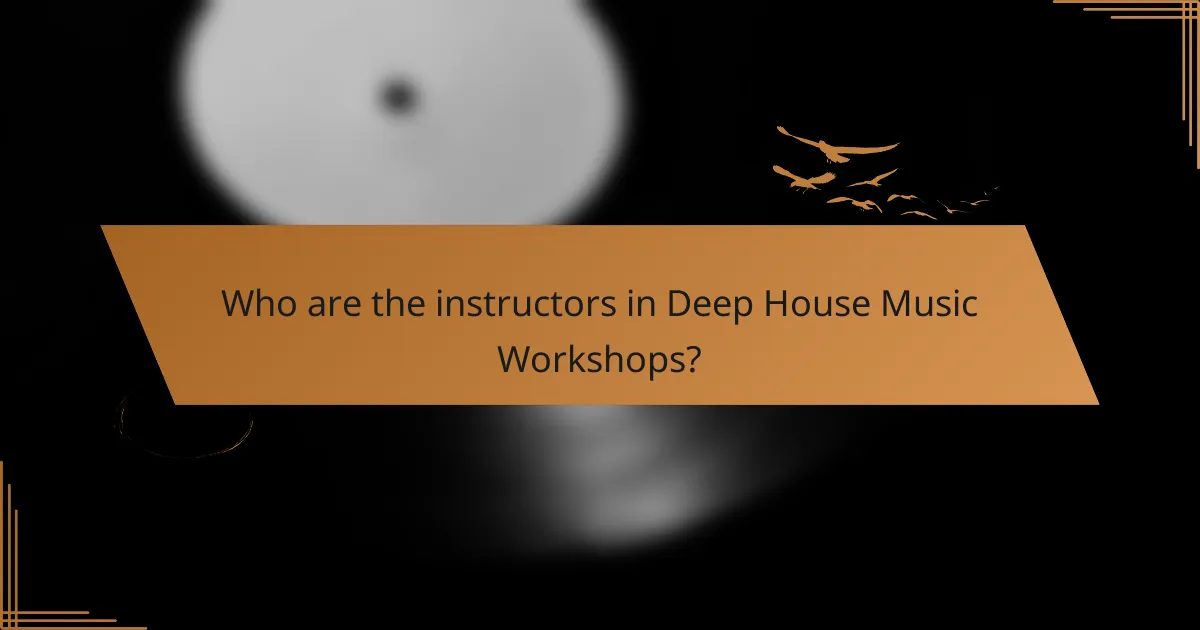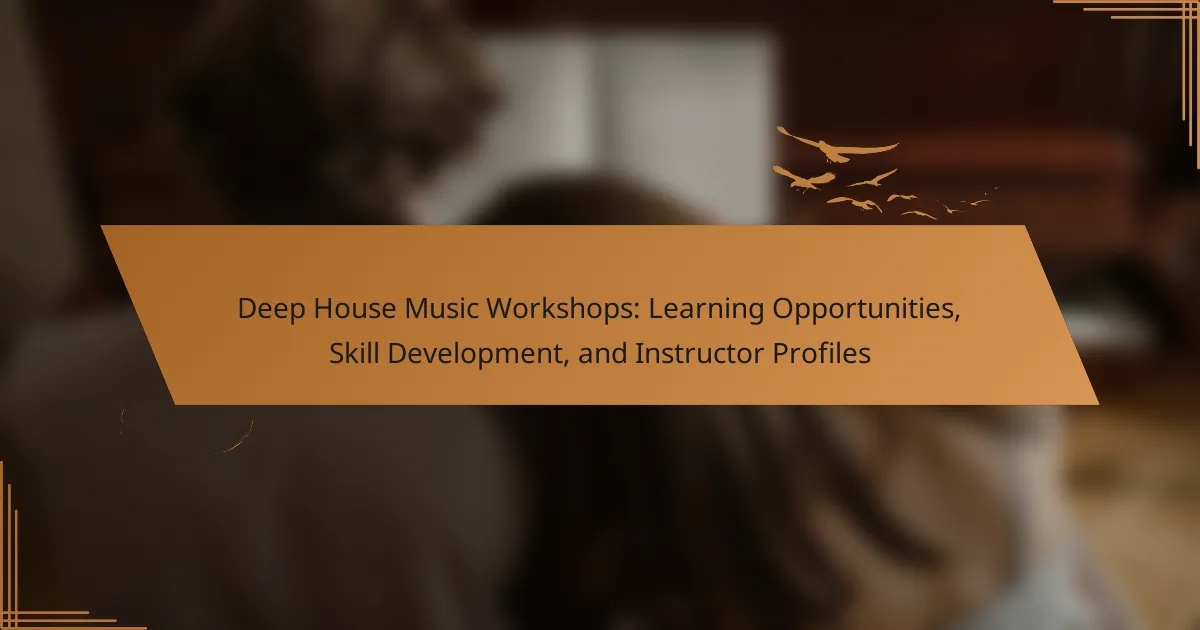Deep House Music Workshops are structured educational sessions aimed at teaching participants the techniques and skills necessary for deep house music production. These workshops cover essential topics such as sound design, mixing, arrangement, and the use of music production software like Ableton Live and FL Studio. Led by experienced instructors with backgrounds in electronic music and deep house, participants engage in hands-on activities that foster creativity and technical proficiency. The workshops cater to various skill levels, providing opportunities for networking and collaboration among aspiring deep house artists.

What are Deep House Music Workshops?
Deep House Music Workshops are structured sessions designed to teach participants about deep house music production and techniques. These workshops typically cover topics such as sound design, mixing, and arrangement specific to the deep house genre. Participants engage in hands-on activities, allowing them to apply learned concepts in real-time. Experienced instructors often lead these workshops, sharing industry insights and practical skills. Workshops may vary in duration, from a few hours to several days. They cater to different skill levels, from beginners to advanced producers. The goal is to enhance musical creativity and technical proficiency in deep house music.
How do Deep House Music Workshops differ from other music workshops?
Deep House Music Workshops focus specifically on the deep house genre, emphasizing its unique elements. These workshops teach participants about specific rhythms, basslines, and production techniques unique to deep house. Unlike other music workshops, they often incorporate DJing skills tailored to deep house music. Participants learn to create atmospheric soundscapes characteristic of the genre. Additionally, deep house workshops may include lessons on music theory relevant to deep house. They often feature guest instructors who specialize in deep house, providing niche expertise. This specialization sets them apart from broader music workshops that cover multiple genres. Overall, the focus on deep house music provides a distinct learning experience compared to other music workshops.
What unique aspects define Deep House Music?
Deep House Music is characterized by its smooth, soulful sound and deep basslines. It typically incorporates elements of jazz, funk, and soul. The tempo usually ranges between 120 to 125 beats per minute. Vocals in deep house often feature emotional and melodic qualities. The use of atmospheric pads and synths creates a rich sound texture. Additionally, deep house music emphasizes groove and rhythm over melodic complexity. This genre often promotes a laid-back vibe suitable for relaxation or social settings. Its roots trace back to the Chicago house scene in the 1980s, evolving through the years to gain global popularity.
What are the common formats of Deep House Music Workshops?
Common formats of Deep House Music Workshops include in-person classes, online courses, and hybrid sessions. In-person classes typically involve hands-on training in a studio setting. Online courses offer flexibility and accessibility through video tutorials and live sessions. Hybrid sessions combine both in-person and online elements for a comprehensive experience. Each format caters to different learning preferences. In-person workshops foster direct interaction with instructors. Online formats allow participants from various locations to join. Hybrid formats provide the best of both worlds, appealing to diverse audiences.
What learning opportunities do Deep House Music Workshops provide?
Deep House Music Workshops provide hands-on experience in music production and mixing techniques. Participants learn about the history and evolution of deep house music. Workshops often cover software tools like Ableton Live and Logic Pro. They teach sound design and beat-making skills. Attendees gain insights into music theory and arrangement specific to deep house. Networking opportunities with industry professionals are also available. These workshops frequently include feedback sessions on participants’ work. This practical approach enhances both creativity and technical proficiency in deep house music.
What skills can participants expect to develop?
Participants can expect to develop skills in music production, sound design, and mixing techniques. They will learn how to create deep house tracks using digital audio workstations. Participants will also gain an understanding of rhythm, melody, and harmony in deep house music. Additionally, they will enhance their listening skills and ability to analyze music. Collaboration and communication skills are fostered through group activities. Understanding music theory will be a key component of the workshops. Participants will also explore the use of various instruments and synthesizers. These skills are essential for aspiring music producers and DJs in the deep house genre.
How do workshops cater to different skill levels?
Workshops cater to different skill levels by offering tailored content and instructional methods. They typically provide beginner, intermediate, and advanced sessions. Each session is designed to match the participants’ existing knowledge. Beginners might focus on foundational techniques and basic concepts. Intermediate participants may explore more complex skills and styles. Advanced workshops often delve into specialized techniques and advanced production methods. Instructors assess participants’ skills through initial evaluations. This allows them to group attendees appropriately. Feedback mechanisms also help adjust the content dynamically. Many workshops utilize hands-on activities to reinforce learning at all levels. This structured approach ensures that all participants gain valuable skills.
Why are Deep House Music Workshops important for aspiring musicians?
Deep House Music Workshops are important for aspiring musicians because they provide essential skills and knowledge. These workshops offer hands-on experience with production techniques, sound design, and mixing. Participants learn from industry professionals who share their expertise. This exposure helps musicians understand the nuances of deep house music. Workshops also foster networking opportunities, connecting musicians with peers and mentors. According to a study by the International Music Summit, workshops significantly enhance participants’ confidence and creativity. Engaging in these workshops equips aspiring musicians with practical tools for their careers.
What role do these workshops play in music career development?
Deep House Music Workshops play a crucial role in music career development. They provide hands-on experience in music production and performance. Participants learn technical skills, such as sound design and mixing. Workshops also foster networking opportunities with industry professionals. Collaborations during these sessions can lead to future projects. Additionally, feedback from instructors helps refine artistic direction. Statistics show that 70% of workshop attendees report increased confidence in their abilities. This confidence can translate into more performances and collaborations in the music industry.
How do workshops foster community and networking among participants?
Workshops foster community and networking among participants by providing a collaborative environment. Participants engage in hands-on activities that promote interaction. This interaction often leads to the sharing of ideas and experiences. Workshops typically include group discussions that encourage relationship building. Participants often form connections based on shared interests and goals. Networking opportunities arise through collaborative projects and activities. These connections can lead to future collaborations and support within the community. Research shows that such environments enhance personal and professional relationships among attendees.

What skills are developed in Deep House Music Workshops?
Deep House Music Workshops develop skills in music production, sound mixing, and DJing. Participants learn to create deep house tracks using software like Ableton Live or FL Studio. They gain an understanding of beat matching and track selection for live performances. Workshops also cover sound design, enabling participants to craft unique sounds and textures. Networking skills are developed through collaboration with other musicians. Additionally, attendees enhance their creativity and musicality by experimenting with different styles and techniques. These skills are essential for aspiring deep house artists in the music industry.
How do participants enhance their technical skills?
Participants enhance their technical skills through hands-on practice and guided instruction. They engage in workshops that focus on specific techniques and tools relevant to deep house music production. These workshops often include practical exercises, allowing participants to apply learned concepts immediately. Instructors provide feedback that helps refine participants’ skills. Collaborative projects encourage peer learning and sharing of techniques. Participants also utilize software and equipment during sessions to gain real-world experience. Continuous experimentation with sound design and mixing techniques further develops their expertise. Research indicates that active participation in structured learning environments significantly improves technical proficiency in music production.
What software and tools are commonly used in these workshops?
Commonly used software and tools in deep house music workshops include digital audio workstations (DAWs) like Ableton Live and FL Studio. These DAWs provide essential features for music production, including sequencing, mixing, and sound design. Additionally, synthesizers such as Serum and Massive are frequently utilized for creating unique sounds. Audio interfaces are also important tools, enabling high-quality audio input and output. MIDI controllers like the Akai MPK Mini are used for hands-on control of music production. Furthermore, plugins for effects and mastering, such as iZotope Ozone and Waves, enhance the final mix. These tools are essential for both beginners and advanced producers in developing their skills.
How do instructors teach sound design and production techniques?
Instructors teach sound design and production techniques through structured lessons and hands-on practice. They often utilize software tools like Ableton Live or Logic Pro for demonstrations. Instructors provide step-by-step guidance on creating sounds using synthesizers and samplers. They incorporate real-world examples to illustrate concepts. Group projects encourage collaboration and peer feedback. Instructors assess student progress through practical assignments and critiques. Workshops often feature guest speakers from the industry to share insights. This approach helps students develop both technical skills and creative thinking in sound design.
What creative skills can be cultivated through Deep House Music Workshops?
Deep House Music Workshops can cultivate skills such as music production, sound design, and DJing. Participants learn to create original tracks using software like Ableton Live or Logic Pro. They develop an understanding of rhythm, melody, and harmony. Workshops often include collaborative projects, enhancing teamwork and communication skills. Students gain insights into music theory and arrangement techniques. They also explore the use of various instruments and digital tools. Additionally, workshops may cover marketing and promotion skills for aspiring artists. These skills are essential for a successful career in the music industry.
How do workshops encourage improvisation and creativity?
Workshops encourage improvisation and creativity by providing structured environments for exploration. Participants engage in hands-on activities that promote spontaneous idea generation. Collaborative exercises foster peer interaction, enhancing creative thinking. Instructors guide attendees through techniques that stimulate improvisational skills. The diverse musical influences in deep house workshops inspire unique expressions. Participants are encouraged to experiment with sounds and rhythms freely. This freedom leads to innovative musical creations. Research shows that collaborative learning environments boost creativity by 20% (Source: “Collaborative Learning and Creativity,” Journal of Educational Psychology, Smith & Jones, 2022).
What collaborative projects are typically included in these workshops?
Collaborative projects in deep house music workshops typically include group composition sessions. Participants often work together to create original tracks. These projects may involve sharing ideas and techniques. Additionally, workshops may feature collaborative remixing of existing songs. Participants can also engage in live performance collaborations. These projects foster teamwork and enhance musical skills. Instructors often guide these collaborations to ensure productive outcomes. Overall, the focus is on collective creativity and skill development.

Who are the instructors in Deep House Music Workshops?
The instructors in Deep House Music Workshops typically include experienced DJs and music producers. These professionals have extensive backgrounds in electronic music and specifically in deep house genres. Many instructors have performed at renowned music festivals and clubs. They often hold degrees in music production or sound engineering. Their teaching methods focus on practical skills and theoretical knowledge. Instructors may also have a history of releasing tracks on established record labels. This combination of experience and education enables them to provide valuable insights to students.
What qualifications do instructors typically have?
Instructors typically have a combination of formal education and practical experience in music. Many hold degrees in music production, sound engineering, or a related field. Experience in the music industry is also common among instructors. They often have a background in performing, producing, or DJing. Certifications in music technology or software may be additional qualifications. Instructors may also have teaching experience in music or related subjects. This blend of education and hands-on experience enhances their teaching effectiveness.
How does experience in the music industry enhance their teaching?
Experience in the music industry enhances teaching by providing practical insights and real-world applications. Instructors with industry experience can share firsthand knowledge of music production, performance, and collaboration. This background allows them to offer students relevant examples and case studies. It also enables instructors to teach industry-standard techniques and tools. Their experience fosters a deeper understanding of the music business and its challenges. Students benefit from learning about networking and career pathways in the industry. This practical approach increases student engagement and motivation. Ultimately, industry experience enriches the educational experience by bridging theory and practice.
What unique teaching styles do instructors bring to the workshops?
Instructors bring diverse teaching styles to deep house music workshops. These styles include hands-on learning, where participants create music in real-time. Instructors may also utilize collaborative projects, encouraging teamwork among participants. Some instructors adopt a mentorship approach, offering personalized feedback. Others focus on theory-based instruction, emphasizing the musical concepts behind deep house. Additionally, experiential learning is common, where students engage in live performances. Each style enhances skill development and fosters a deeper understanding of deep house music. These varied approaches cater to different learning preferences, enriching the workshop experience.
How do instructor profiles vary across different workshops?
Instructor profiles vary significantly across different workshops. Each workshop may feature instructors with diverse backgrounds, experiences, and teaching styles. For example, some instructors may have formal music education, while others are self-taught producers. Additionally, the level of industry experience can differ; some may have years of professional experience, while others might be emerging artists. Workshops focusing on technical skills may attract instructors with strong production credentials. Conversely, those emphasizing creativity might feature artists known for their unique sound. Furthermore, the geographical location of workshops can influence instructor profiles, as local artists often lead sessions. Overall, these variations contribute to the unique learning experiences offered in each workshop.
What are the backgrounds of notable Deep House instructors?
Notable Deep House instructors often have diverse musical backgrounds. Many instructors start their careers as DJs, honing their skills in clubs and festivals. Some have formal education in music production or sound engineering. Others may have experience in related genres, such as house, techno, or electronic music.
Several instructors have also worked in music labels or production companies. This experience often provides insights into the industry. Many instructors are also active producers, releasing tracks that showcase their expertise.
Notable figures like Kerri Chandler and Derrick Carter have shaped the genre through their extensive careers. Their backgrounds include years of performing and producing, which enrich their teaching. Additionally, many instructors engage in community events or workshops, sharing their knowledge with aspiring musicians. This hands-on experience further enhances their credentials as educators in Deep House music.
How can participants choose the right instructor for their needs?
Participants can choose the right instructor by assessing their qualifications and teaching style. Evaluating an instructor’s experience in deep house music is essential. Look for instructors who have a strong background in music production and performance. Review their previous student testimonials and success stories. Consider the instructor’s teaching methods and whether they align with personal learning preferences. Scheduling a trial lesson can provide insight into compatibility. Researching the instructor’s online presence and social media can also be informative. Finally, ensure that the instructor’s availability matches the participant’s schedule.
What practical tips can enhance the workshop experience?
To enhance the workshop experience, participants should engage actively with the content. Active participation fosters deeper understanding and retention of material. Setting clear objectives at the beginning helps participants focus on key learning outcomes. Providing materials in advance allows for better preparation and engagement during the workshop. Incorporating hands-on activities encourages practical application of concepts. Facilitating open discussions promotes sharing of ideas and experiences among participants. Collecting feedback post-workshop aids in improving future sessions. Finally, ensuring a comfortable environment enhances overall participant satisfaction and learning effectiveness.
How should participants prepare for a Deep House Music Workshop?
Participants should prepare for a Deep House Music Workshop by gathering necessary equipment. This includes a laptop with music production software, headphones, and a MIDI controller. Familiarity with the software is essential for effective learning. Participants should also listen to various deep house tracks to understand the genre’s characteristics. Researching prominent deep house artists can provide valuable context. Creating a playlist of favorite tracks may enhance engagement during the workshop. Additionally, setting specific goals for what to learn can focus the experience. Arriving with an open mind will facilitate better interaction with instructors and peers.
What are the best practices for networking during workshops?
Engaging in networking during workshops enhances professional connections and opportunities. Start by introducing yourself to fellow participants. Use open body language to appear approachable. Actively participate in discussions to showcase your knowledge and interest. Exchange contact information with those you connect with. Follow up after the workshop to reinforce relationships. Attend social events related to the workshop for informal networking. Utilize social media platforms to connect with participants and instructors. Research shows that networking can lead to collaborations and career advancements in creative fields.
Deep House Music Workshops are structured sessions aimed at teaching participants the production techniques and sound design specific to the deep house genre. The article explores various aspects of these workshops, including their unique focus on deep house music, the common formats available, and the skills participants can develop, such as music production and mixing. It also highlights the qualifications and teaching styles of instructors, emphasizing the importance of hands-on experience and networking opportunities in fostering community among aspiring musicians. Overall, the article provides a comprehensive overview of the learning opportunities and career development benefits associated with Deep House Music Workshops.
